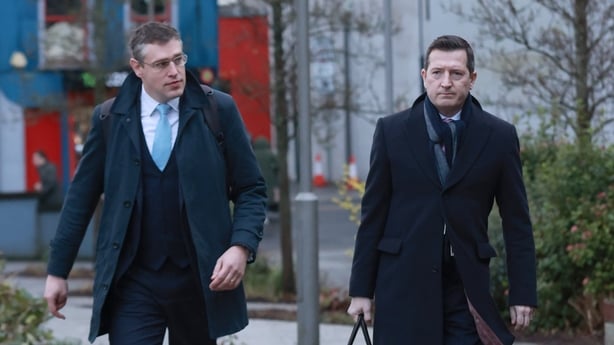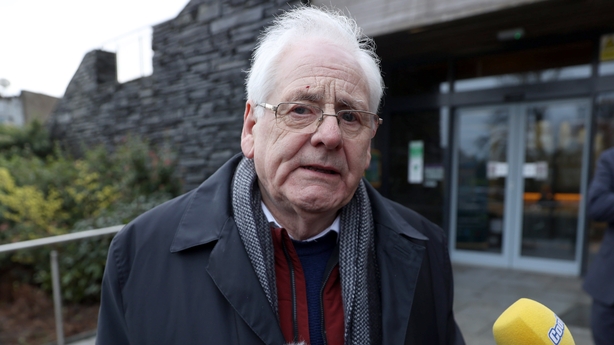The names of the 29 victims, including a woman pregnant with twins, were read aloud and a minute's silence was held as a public inquiry into the 1998 Omagh bombing got under way.
The opening session of the inquiry was told that the evidence it hears will be distressing.
Chairperson Alan Turnball said those who listen "will be shocked at level of grief imposed on ordinary decent members of society doing nothing other than living their daily lives".
The inquiry was established by the British government to examine whether the attack by dissident republican group the Real IRA could have been prevented by UK state authorities.
Before the examination of the evidence begins, the focus will be on the 29 lives that were lost, including a woman pregnant with twins, on a sunny afternoon in August 1998.
The youngest victim was 18 months old, the eldest 65 and 15 of those who were killed were aged 17 or younger.
More than 200 people were injured in the huge car bomb, many of them seriously.
The inquiry chairperson made it clear that he wants to hear the stories of those killed and injured, and the many others impacted by a bombing that caused the biggest single loss of life in the history of Northern Ireland's Troubles.
Relatives of each of those who were killed will have the opportunity to make personal testimonies about them, the kind of people they were and the impact of their loss.
In opening remarks this morning, Mr Turnball said those personal stories would "give content and meaning to the bare facts and numbers."
Pen portraits of each of the victims and statements about the impact of their loss will be read over the course of the next two weeks.
All of the statements will be livestreamed and can be viewed by members of the public.
A lawyer for the inquiry said the aim was "to put those who deserve explanations at the start of the process."
"It will be distressing evidence to listen to, but it is vital that it is heard in public," lawyer Paul Greaney told family members and survivors of the attack who attended the opening hearing at the Strule Arts Centre in Omagh this morning.
"Understanding the impact of the bombing is critical to the investigation of the issue of preventability and for that reason we will not shy away from shining a light on the terrible consequences of that day."
Statements on behalf of two Spanish victims of the attack were read at the inquiry today.
Schoolboy Fernando Blasco Baselga, 12, and his youth group leader Rocio Abad Ramos, a 23-year-old science student, were part of an exchange visit to Buncrana in Co Donegal, and were in Omagh for a day trip when the bomb went off.
Government won't be found wanting in co-operation - Harris
Tánaiste Simon Harris has said the Government will "not be found wanting" in co-operation with the inquiry.
In a statement, the Minister for Foreign Affairs said: "Everybody in Ireland remembers the horror of that sunny August afternoon in Omagh, and today will be another stark reminder of the pain and suffering caused to so many families as the commemorative hearings begin.
"Testimony over the coming weeks will be difficult, especially for those who lost loved ones, and for those who responded first as the news broke, but it is important to remind ourselves of the full horror of that brutal attack, to remind ourselves of the purpose of this inquiry.
"When I was taoiseach, the Government took a clear decision to assist the Omagh Inquiry. That commitment was made clear, publicly, at the preliminary hearing last August.
"The Programme for Government repeats that commitment in no uncertain terms, stating plainly that we will 'play our full part in legacy processes...including facilitating and supporting the Omagh Inquiry'.
"The cross-border nature of the assistance, to an inquiry established under UK law, means that it takes some work to get the details of the mechanisms of co-operation right, but we are actively engaging in this work and we will not be found wanting."

In his opening statement, the chairperson said the commemorative hearings will have an "important value" in educating others about the real effect of terrorism.
"Those beyond Omagh who listen and watch will, as I was, be shocked at the level of grief imposed on ordinary decent members of society doing nothing other than living their daily lives," he said.
"Those who watch and listen will be overwhelmed and humbled, as I have been, on hearing of the appalling injuries inflicted on people of all ages and of the dignity and compassion with which so many of those have coped with the changes in their circumstances which have been imposed upon them.
"The evidence sessions will accordingly have an important value in informing and educating others as to the real effect of terrorist violence.
"In this way, it is my sincere hope that all of those who supported or condoned the use of such acts of violence will learn of the actual indiscriminate and devastating consequences of the such selfish conduct for innocent, hard-working and caring people of all ages and for their communities."
Read more: Omagh families prepare for public inquiry after long road
Those commemorative hearings will last for two weeks, followed by a week of statements by survivors of the atrocity, then a week of the stories of the emergency service members who dealt with its aftermath.
The evidential hearings are expected to be held before the summer and are expected to include contributions from the Irish Government.
The Real IRA bomb was made in the Republic and some of those involved lived there.
The Irish Government, which has been criticised by many of the relatives for not establishing its own inquiry, has said it will do all in its power to help the UK hearing.
Focus on victims will 'bring humanity' to inquiry
Earlier, the father of one of the victims said a focus on those who died will "bring humanity" to proceedings.
Michael Gallagher, whose son Aiden was killed in the bomb, said it will be a difficult day.
Mr Gallagher said: "It's important to be here to support the other families, the Spanish families are giving evidence this morning, it's going to be difficult.

"It brings a lot of it back, but it's hugely important to focus this week and next week and the week after on the victims. In all of this sometimes the voice of the victims is lost because there are so many technical arguments but this brings humanity to it."
Mr Gallagher campaigned for many years for the inquiry said sometimes he felt like he had to pinch himself that it was happening.
"I just hope for me that this is the beginning of the end, that we do get the answers we need, that both the British government and the Irish Government fully co-operate with the inquiry and as a bereaved parent I can say that's all I can do, and I'm very grateful for everybody who helped us get to this point where we can send an end."
Additional reporting PA







